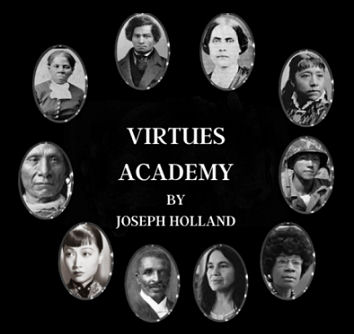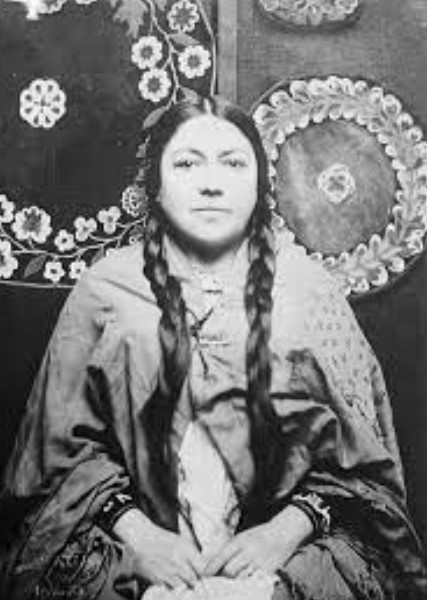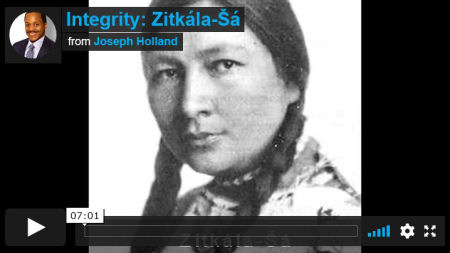
Zitkala Sa
WORD OF THE DAY
PERSONAL CONTEXT
HISTORICAL CONTEXT
SUCCESS PRINCIPLE
CIVICS LESSON
Click below to listen to audio:
LET OTHERS KNOW WHO YOU TRULY ARE
The voice of the Great Spirit is heard in the twittering of birds,
the rippling of mighty waters, and the sweet breathing of flowers.
Zitkála-Šá
In 1884 eight-year-old Zitkála-Šá left the Yankton Indian Reservation in South Dakota where she had been born, traveling to Wabash, Indiana to attend the Indiana Manual Labor Institute. Though Zitkála learned to read and write English and play the violin, she was concerned about the assimilationist zeal of the Quaker missionary school: she was forced to cut her traditionally long hair and to distance herself from the mores of her tribe. She articulated her distress:
Perhaps my Indian nature is the moaning wind which stirs my schoolteachers now . . . But, however tempestuous this is within me, it comes out as the low voice of a curiously colored seashell, which is only for those ears that are bent with compassion to hear it.
Zitkála left the missionary school then returned a few years later, passionate about her musical studies, eventually doing advanced work in the violin at the New England Conservatory of Music in Boston. She taught music at Carlisle Indian Industrial School in Pennsylvania and performed with the school’s band at the Paris Exposition in 1900. She later collaborated with American composer William F. Hanson, playing Sioux melodies on the violin, for which she wrote libretto and songs. Her creative work led to “The Sun Dance Opera”; based on Sioux and Ute cultural themes, it was the first opera adapted from the Native American oral musical tradition.
Zitkála’s other passion was writing, which featured her struggles with cultural identity: the tension between her Native American traditions and majority white society. She wrote both autobiographical narratives and legendary stories from Native American history. Zitkála also served as editor of the “American Indian Magazine”, to which she contributed numerous articles.
Rising from her literary activism, she co-founded and was president of the National Council of American Indians, whose influence fostered the Indian Reorganization Act of 1934, which became known as the “Indian New Deal”. Zitkála used her music, writings and activism to let others know who she truly was. Let others know who you truly are by practicing these principles.
REFLECTION
The first step is for you to realize who you truly are on the inside, to get in touch with your character. One of the best ways to do it is reflection: take some time each day in prayerful meditation; let your mind focus on your actions and motivations for doing them. As you get disciplined about this quiet time, you will realize more and more whether there’s consistency or Integrity conflict between what you say and what you do. Start your quiet discipline by reflecting on Molière’s words.
Men are alike in their promises. It is only in their deeds that they differ. The difference in their deeds is simple: People of character do what is right regardless of the situation.
REVELATION
Zitkála sang and wrote about her struggles as well as her triumphs. Be transparent about your flaws and weaknesses, about your quirks and idiosyncrasies. Reveal your inner truth, open a window to your soul. Share with someone you trust what you’re truly feeling; you will be making a step towards emotional maturity. Sing your own song. Write your own story.
RAMIFICATION
Make a move to get out of your own little world. Don’t be a prisoner of your own mind — nor of your narrow circumstances. Stretch your mind by reading a new book. Branch out by visiting a different neighborhood or a distant shore. Zitkála ended up performing music in Paris. A change of perspective and a change of place will broaden your understanding as you communicate it to others.
REWARD
Zitkála worked hard to help others win; her advocacy led to passage of federal legislation that furthered the rights of all Native Americans. Your greatest reward in life is helping other people win. Zitkála overcame countless obstacles to do it. Why not you?
KEY POINTS
WORD OF THE DAY
Tempestuous – characterized by strong and turbulent or conflicting emotion.
PERSONAL CONTEXT
Also known by her missionary and married names Gertrude Simmons Bonnin, Zitkála-Šá was born and raised on the Yankton Indian Reservation in South Dakota until she was taken away to a Quaker missionary boarding school in Indiana. The assimilationist ways of these missionaries made her upbringing an ordeal that shaped her mission in life.
HISTORICAL CONTEXT
Co-founded by Zitkála-Šá in 1926, the National Council of American Indians advocated for Native American before the federal government. This organization paved the way for the National Congress of American Indians, which, since its founding in 1944, has become the largest and most important intertribal political organizations advancing Native American Rights.
SUCCESS PRINCIPLE
See Success Principle Worksheet
CIVICS LESSON
See Civics Lesson Worksheet
*See Zitkála-Šá Video for more information


